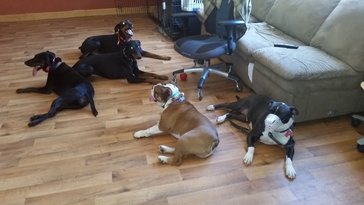
Should I give in to this, it is a mistake on my part. In fact, I can name a few times I did ignore my rules, and lived to regret that decision. There are very nice people and dogs out there. Some of them can not conform to the things that I need in order for them to be clients of a certain type.
This does not make them bad humans or dogs, but bad for certain situations in my business model. Many times, I will read negative reviews about another dog facility that turned away business. The dog's owner is usually quite offended, but often times I see this from the facility's standpoint. I also understand that the client can not see the real issue at hand, not having worked with so many dogs in one small area. They think their dog has been seen as a "bad" dog or a "problem" dog. This may not at all be the case, this dog just might not fit into either the pack or business model that this facility caters to.
The pack can be a tricky situation. Packs that work here are expected to have a certain level of basic obedience. If one does not have that level of basic obedience or a way to reinforce a command should the training not be up to par, I have been aware in the past that it causes problems. As time marches on, it is easy for a person like myself to forget the problems that can crop up, if I bend the rules for someone.
The problem with bringing a dog into a pack that can not respond to the first command given during distractions takes away from the leader's ability to promote well being within the pack. If that one dog is allowed to freedoms which they have not earned, it will cause problems. Should a problem occur, more than one dog may need to respond to a command in an immediately. It is not about just that one dog, but the relationship among the whole pack including me. Managing a pack is about teamwork between the human and all the canines in the group.
Another problem is that the other dogs who are well behaved loose their freedom by needing to be put from command to command more often, to keep the untrained dog from getting into sticky situations that they can not handle. The canine groups may not able to communicate to the newer member the ways in which they would like to be interacted with. Often I help this communication among unfamiliar members with the use of training which has produced workable commands. There are some dog day cares that cater to mostly untrained dogs by screening out other untrained temperaments that will not work in their structure.
Human owners who feel their dog is "trained well enough" often have suggestions for you in having their dog to come to your daycare. Often this includes commands either commands that do not work as they have not been taught to the dog or an expectation of free training from the daycare provider. Often even when the owner sees their own suggestion does not work even for under their own guidance, the owner will not acknowledge that or just does not get the level of performance that is required. As a dog professional it's more important to see to the needs of the group than the one.
For a daycare owner and operator to ignore that is a big mistake. My advice to other dog professionals is to not forget what your protocols are. If they have worked for you in the past, then please do not forsake them for the sake of not hurting someones feelings or offending them. It's better off for all involved if you just stick to your guns. In this economy, it's always hard to turn away business especially for a nice (yet untrained) dog and people. Sometimes, it's just the right thing to do.
Human clients please be aware that if you are turned away, it is nothing at all personal. There often is a larger scope to think about than just your dog. An area where a lot of dogs gather is so much different than a dog with your friends and their dogs that they see once a weekend at the beach. Dogs have relationships as much as we do. Like our relationships grow and change with other people, so do dog relationships especially in the beginning.
At Mannerly Mutts, all our dog daycare clients have been past training clients, who have been approved for daycare. If you would like to start on your journey of training your dog, please call, e-mail, or fill out our client interview form.
 RSS Feed
RSS Feed